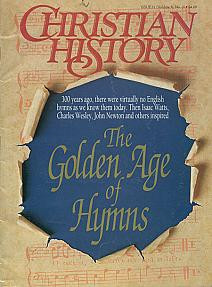Hymnist Hastings Sang in a New World

Half-blind Hastings wrote the music to "Rock of Ages" and other well-known hymns.
THOMAS HASTINGS was born an albino in 1784 in Connecticut. His lack of pigmentation may have been responsible for the eye trouble he experienced all his life. This ailment seriously set back his early efforts to become a music teacher.
Life was hard when he was young. Hastings had to fell trees and plow virgin soil on a farm in upper New York. What little education he obtained was by walking six miles a day in winter. Though his first music teacher was incompetent, Hastings’s passion for music was such that he continued to study. Bad eyes did not prevent him from teaching himself the fundamentals of music, which he learned from old books on psalmody and the principles of music. He became the choir leader of his village church. His first attempts to get hired as a singing teacher were thwarted by his near-sightedness, however.
Despite also having to farm and serve as an editor (of Musical Magazine) for many years, he persisted with music, his desire driving him to compose hymn tunes. If you have sung “Rock of Ages” or the lesser-known “Majestic Sweetness Sits Enthroned upon the Savior’s Brow” and “From Every Stormy Wind that Blows,” you’ve sung a Thomas Hastings tune.
While the colonial era had been notable for psalm composers, Hastings’s era belonged to singing schoolteachers. Eventually his worth was recognized and he became one of America’s great singing teachers, easily among the top ten of his day. During his prime, twelve churches in the New York era banded together with an offer of support if he would move to the city. He agreed, and remained there the rest of his life. Altogether, Hastings published more than fifty collections of sacred music and wrote six hundred hymns of his own. His music exerted great influence upon hymns through his turn from British forms to German classical models.
Hastings’s poetry seldom rose above the level of versification. None of his texts had the power of the hymns of Wesley, Watts, or Crosby. Typical of his lines are these:
Sing of the Lamb that once was slain,
That man might be forgiv’n;
Sing how he broke death’s bars in twain,
Ascending high in bliss to reign,
The God of earth and heav’n.
In his old age, Hastings lived with his son, who said of him, “He was a devout and earnest Christian, a hard student, and a resolute worker, not laying aside his pen until three days before his death.” Hastings closed his eyes on this world and ascended to sing in a better land on this day, 15 May 1872.
—Dan Graves
----- ----- -----
For more about Christian hymns, see Christian History # 31, Golden Age of Hymns






